Case Study: Cheque Payments, Obligations, and Contractual Rights
VerifiedAdded on 2023/06/09
|5
|1014
|132
Case Study
AI Summary
This case study examines a scenario where Ben issued a cheque to Kate for a vehicle purchase, but Kate ceded her rights to Thandi. The core issue is whether both Kate and Thandi can claim payment from Ben. Applying the Bill of Exchange Act 34 of 1964 and relevant case law such as Adams v SA Motor Industry Employers Association and Froman v Robertson, the analysis concludes that neither Kate nor Thandi can claim payment. Kate's cession extinguished her rights under the contract, and Ben retains the right to countermand the cheque. The study highlights the relationship between underlying contractual obligations and cambial obligations arising from negotiable instruments. Desklib provides access to similar solved assignments and past papers for students.
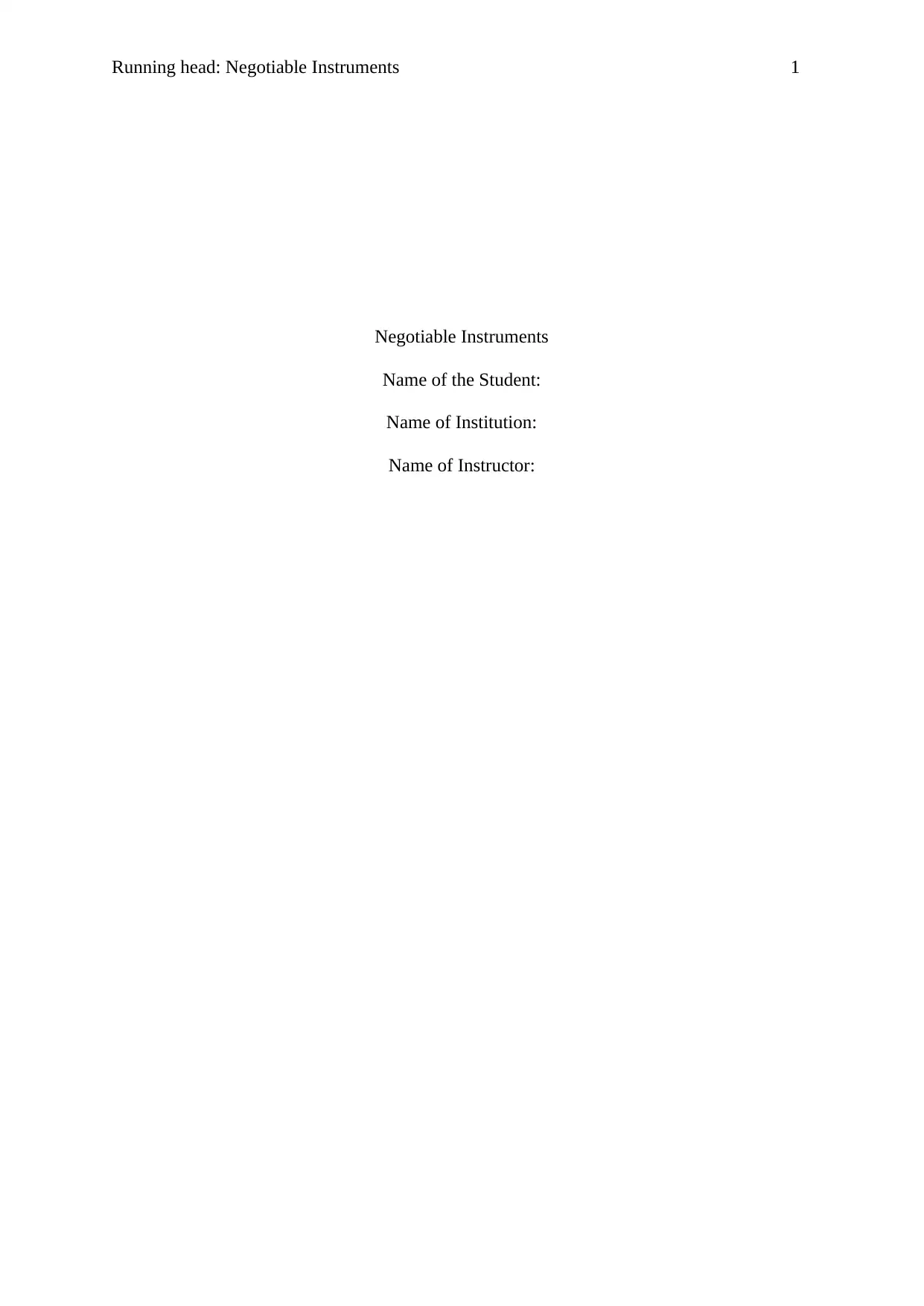
Running head: Negotiable Instruments 1
Negotiable Instruments
Name of the Student:
Name of Institution:
Name of Instructor:
Negotiable Instruments
Name of the Student:
Name of Institution:
Name of Instructor:
Paraphrase This Document
Need a fresh take? Get an instant paraphrase of this document with our AI Paraphraser
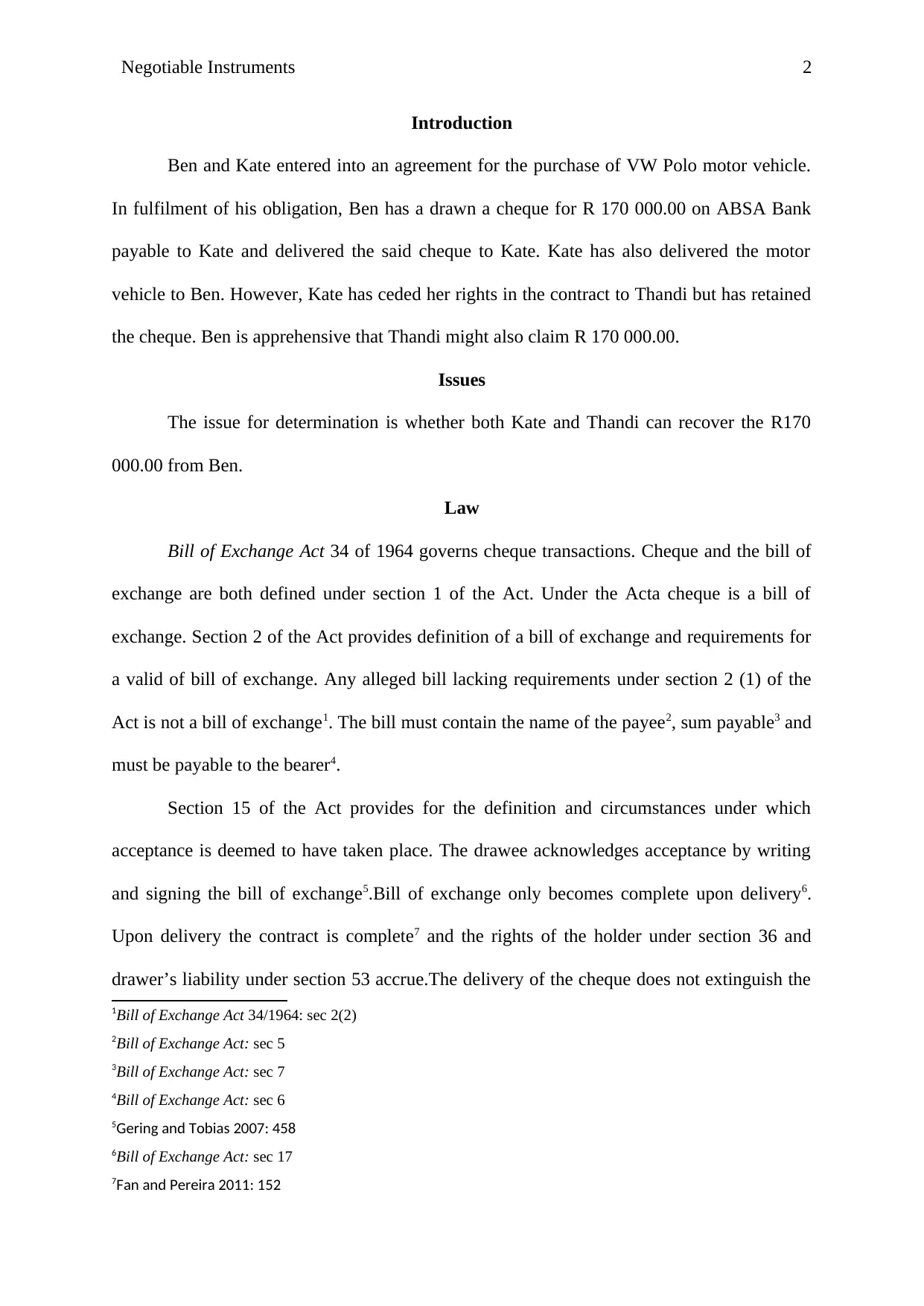
Negotiable Instruments 2
Introduction
Ben and Kate entered into an agreement for the purchase of VW Polo motor vehicle.
In fulfilment of his obligation, Ben has a drawn a cheque for R 170 000.00 on ABSA Bank
payable to Kate and delivered the said cheque to Kate. Kate has also delivered the motor
vehicle to Ben. However, Kate has ceded her rights in the contract to Thandi but has retained
the cheque. Ben is apprehensive that Thandi might also claim R 170 000.00.
Issues
The issue for determination is whether both Kate and Thandi can recover the R170
000.00 from Ben.
Law
Bill of Exchange Act 34 of 1964 governs cheque transactions. Cheque and the bill of
exchange are both defined under section 1 of the Act. Under the Acta cheque is a bill of
exchange. Section 2 of the Act provides definition of a bill of exchange and requirements for
a valid of bill of exchange. Any alleged bill lacking requirements under section 2 (1) of the
Act is not a bill of exchange1. The bill must contain the name of the payee2, sum payable3 and
must be payable to the bearer4.
Section 15 of the Act provides for the definition and circumstances under which
acceptance is deemed to have taken place. The drawee acknowledges acceptance by writing
and signing the bill of exchange5.Bill of exchange only becomes complete upon delivery6.
Upon delivery the contract is complete7 and the rights of the holder under section 36 and
drawer’s liability under section 53 accrue.The delivery of the cheque does not extinguish the
1Bill of Exchange Act 34/1964: sec 2(2)
2Bill of Exchange Act: sec 5
3Bill of Exchange Act: sec 7
4Bill of Exchange Act: sec 6
5Gering and Tobias 2007: 458
6Bill of Exchange Act: sec 17
7Fan and Pereira 2011: 152
Introduction
Ben and Kate entered into an agreement for the purchase of VW Polo motor vehicle.
In fulfilment of his obligation, Ben has a drawn a cheque for R 170 000.00 on ABSA Bank
payable to Kate and delivered the said cheque to Kate. Kate has also delivered the motor
vehicle to Ben. However, Kate has ceded her rights in the contract to Thandi but has retained
the cheque. Ben is apprehensive that Thandi might also claim R 170 000.00.
Issues
The issue for determination is whether both Kate and Thandi can recover the R170
000.00 from Ben.
Law
Bill of Exchange Act 34 of 1964 governs cheque transactions. Cheque and the bill of
exchange are both defined under section 1 of the Act. Under the Acta cheque is a bill of
exchange. Section 2 of the Act provides definition of a bill of exchange and requirements for
a valid of bill of exchange. Any alleged bill lacking requirements under section 2 (1) of the
Act is not a bill of exchange1. The bill must contain the name of the payee2, sum payable3 and
must be payable to the bearer4.
Section 15 of the Act provides for the definition and circumstances under which
acceptance is deemed to have taken place. The drawee acknowledges acceptance by writing
and signing the bill of exchange5.Bill of exchange only becomes complete upon delivery6.
Upon delivery the contract is complete7 and the rights of the holder under section 36 and
drawer’s liability under section 53 accrue.The delivery of the cheque does not extinguish the
1Bill of Exchange Act 34/1964: sec 2(2)
2Bill of Exchange Act: sec 5
3Bill of Exchange Act: sec 7
4Bill of Exchange Act: sec 6
5Gering and Tobias 2007: 458
6Bill of Exchange Act: sec 17
7Fan and Pereira 2011: 152
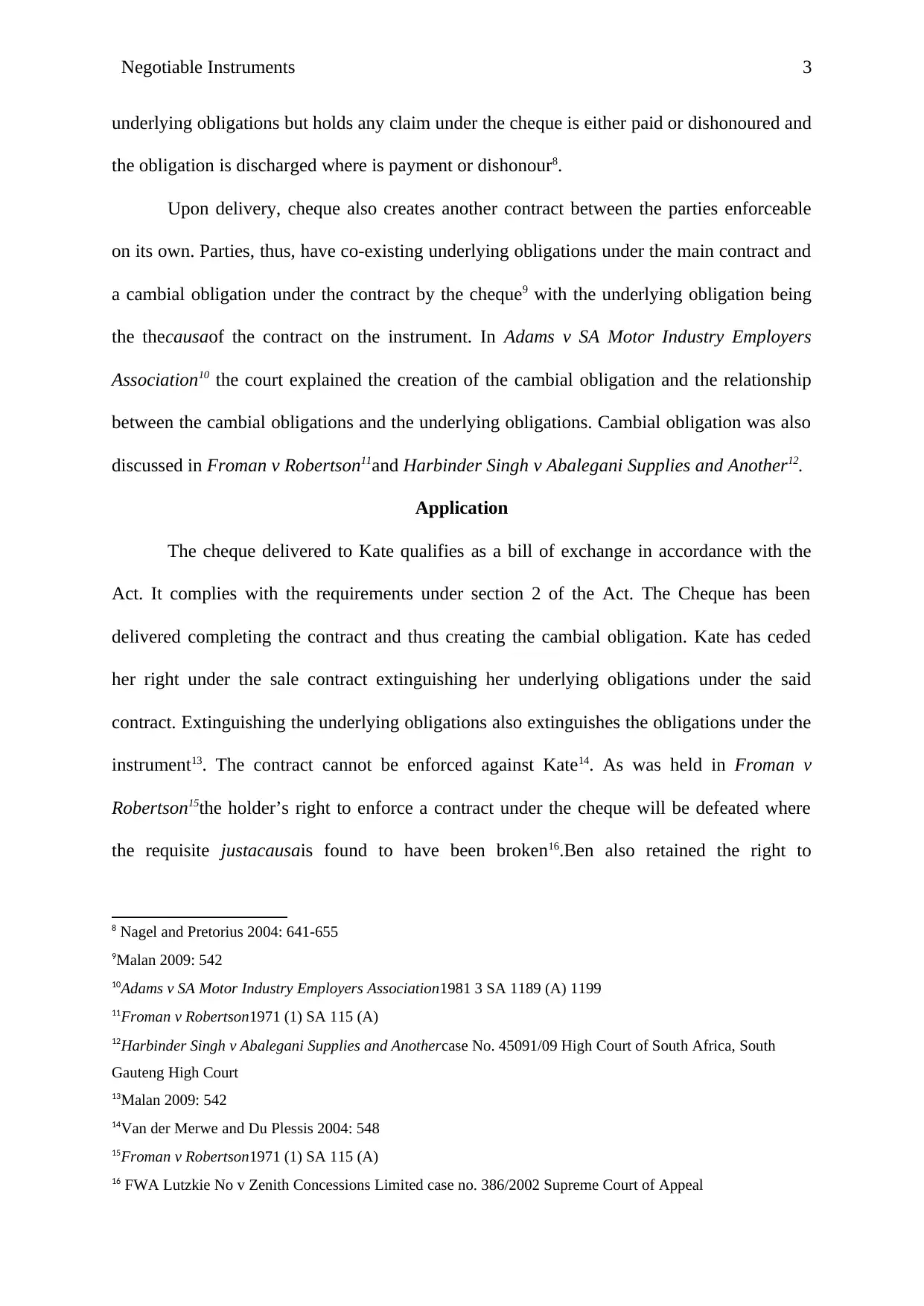
Negotiable Instruments 3
underlying obligations but holds any claim under the cheque is either paid or dishonoured and
the obligation is discharged where is payment or dishonour8.
Upon delivery, cheque also creates another contract between the parties enforceable
on its own. Parties, thus, have co-existing underlying obligations under the main contract and
a cambial obligation under the contract by the cheque9 with the underlying obligation being
the thecausaof the contract on the instrument. In Adams v SA Motor Industry Employers
Association10 the court explained the creation of the cambial obligation and the relationship
between the cambial obligations and the underlying obligations. Cambial obligation was also
discussed in Froman v Robertson11and Harbinder Singh v Abalegani Supplies and Another12.
Application
The cheque delivered to Kate qualifies as a bill of exchange in accordance with the
Act. It complies with the requirements under section 2 of the Act. The Cheque has been
delivered completing the contract and thus creating the cambial obligation. Kate has ceded
her right under the sale contract extinguishing her underlying obligations under the said
contract. Extinguishing the underlying obligations also extinguishes the obligations under the
instrument13. The contract cannot be enforced against Kate14. As was held in Froman v
Robertson15the holder’s right to enforce a contract under the cheque will be defeated where
the requisite justacausais found to have been broken16.Ben also retained the right to
8 Nagel and Pretorius 2004: 641-655
9Malan 2009: 542
10Adams v SA Motor Industry Employers Association1981 3 SA 1189 (A) 1199
11Froman v Robertson1971 (1) SA 115 (A)
12Harbinder Singh v Abalegani Supplies and Anothercase No. 45091/09 High Court of South Africa, South
Gauteng High Court
13Malan 2009: 542
14Van der Merwe and Du Plessis 2004: 548
15Froman v Robertson1971 (1) SA 115 (A)
16 FWA Lutzkie No v Zenith Concessions Limited case no. 386/2002 Supreme Court of Appeal
underlying obligations but holds any claim under the cheque is either paid or dishonoured and
the obligation is discharged where is payment or dishonour8.
Upon delivery, cheque also creates another contract between the parties enforceable
on its own. Parties, thus, have co-existing underlying obligations under the main contract and
a cambial obligation under the contract by the cheque9 with the underlying obligation being
the thecausaof the contract on the instrument. In Adams v SA Motor Industry Employers
Association10 the court explained the creation of the cambial obligation and the relationship
between the cambial obligations and the underlying obligations. Cambial obligation was also
discussed in Froman v Robertson11and Harbinder Singh v Abalegani Supplies and Another12.
Application
The cheque delivered to Kate qualifies as a bill of exchange in accordance with the
Act. It complies with the requirements under section 2 of the Act. The Cheque has been
delivered completing the contract and thus creating the cambial obligation. Kate has ceded
her right under the sale contract extinguishing her underlying obligations under the said
contract. Extinguishing the underlying obligations also extinguishes the obligations under the
instrument13. The contract cannot be enforced against Kate14. As was held in Froman v
Robertson15the holder’s right to enforce a contract under the cheque will be defeated where
the requisite justacausais found to have been broken16.Ben also retained the right to
8 Nagel and Pretorius 2004: 641-655
9Malan 2009: 542
10Adams v SA Motor Industry Employers Association1981 3 SA 1189 (A) 1199
11Froman v Robertson1971 (1) SA 115 (A)
12Harbinder Singh v Abalegani Supplies and Anothercase No. 45091/09 High Court of South Africa, South
Gauteng High Court
13Malan 2009: 542
14Van der Merwe and Du Plessis 2004: 548
15Froman v Robertson1971 (1) SA 115 (A)
16 FWA Lutzkie No v Zenith Concessions Limited case no. 386/2002 Supreme Court of Appeal
⊘ This is a preview!⊘
Do you want full access?
Subscribe today to unlock all pages.

Trusted by 1+ million students worldwide
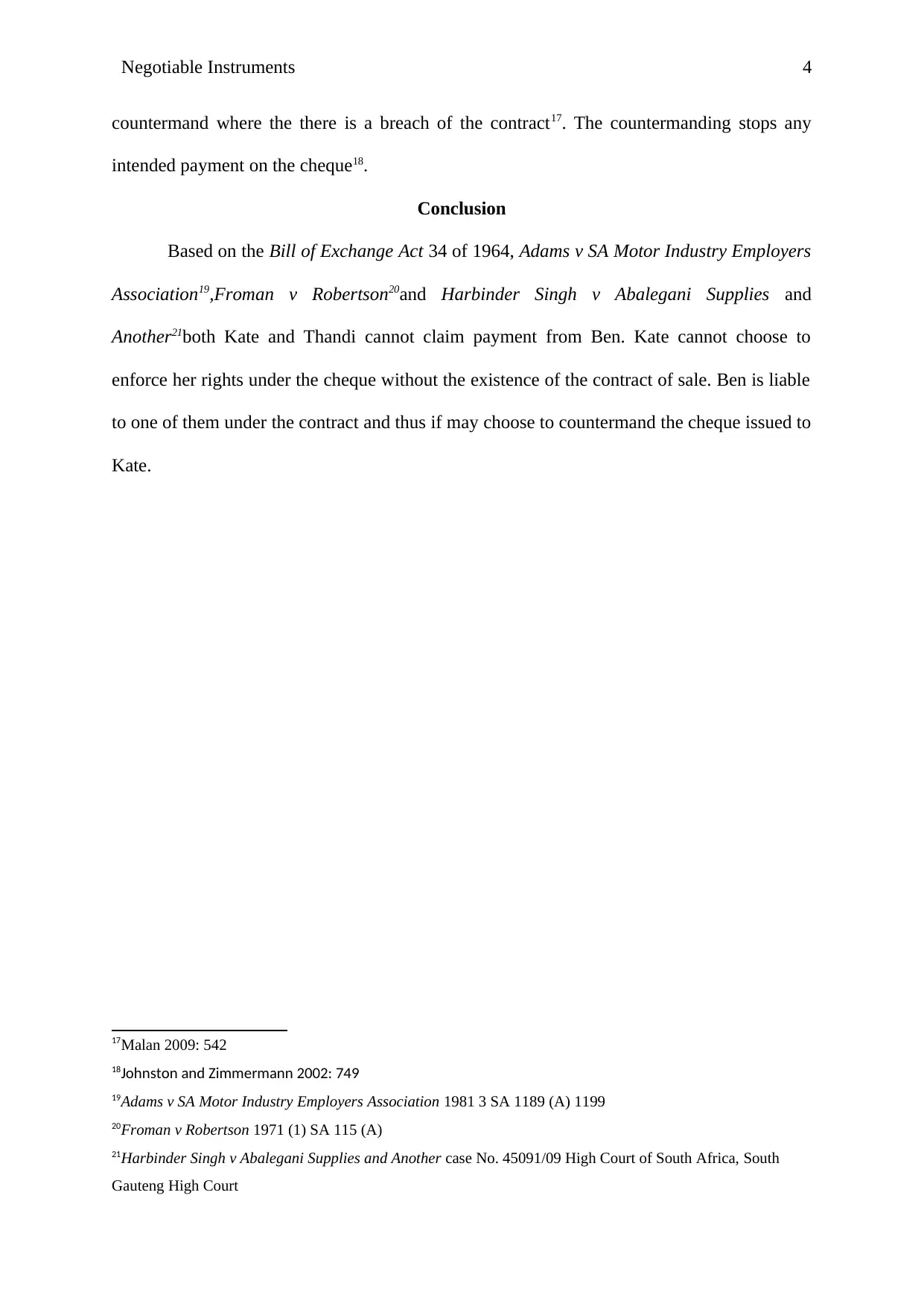
Negotiable Instruments 4
countermand where the there is a breach of the contract17. The countermanding stops any
intended payment on the cheque18.
Conclusion
Based on the Bill of Exchange Act 34 of 1964, Adams v SA Motor Industry Employers
Association19,Froman v Robertson20and Harbinder Singh v Abalegani Supplies and
Another21both Kate and Thandi cannot claim payment from Ben. Kate cannot choose to
enforce her rights under the cheque without the existence of the contract of sale. Ben is liable
to one of them under the contract and thus if may choose to countermand the cheque issued to
Kate.
17Malan 2009: 542
18Johnston and Zimmermann 2002: 749
19Adams v SA Motor Industry Employers Association 1981 3 SA 1189 (A) 1199
20Froman v Robertson 1971 (1) SA 115 (A)
21Harbinder Singh v Abalegani Supplies and Another case No. 45091/09 High Court of South Africa, South
Gauteng High Court
countermand where the there is a breach of the contract17. The countermanding stops any
intended payment on the cheque18.
Conclusion
Based on the Bill of Exchange Act 34 of 1964, Adams v SA Motor Industry Employers
Association19,Froman v Robertson20and Harbinder Singh v Abalegani Supplies and
Another21both Kate and Thandi cannot claim payment from Ben. Kate cannot choose to
enforce her rights under the cheque without the existence of the contract of sale. Ben is liable
to one of them under the contract and thus if may choose to countermand the cheque issued to
Kate.
17Malan 2009: 542
18Johnston and Zimmermann 2002: 749
19Adams v SA Motor Industry Employers Association 1981 3 SA 1189 (A) 1199
20Froman v Robertson 1971 (1) SA 115 (A)
21Harbinder Singh v Abalegani Supplies and Another case No. 45091/09 High Court of South Africa, South
Gauteng High Court
Paraphrase This Document
Need a fresh take? Get an instant paraphrase of this document with our AI Paraphraser
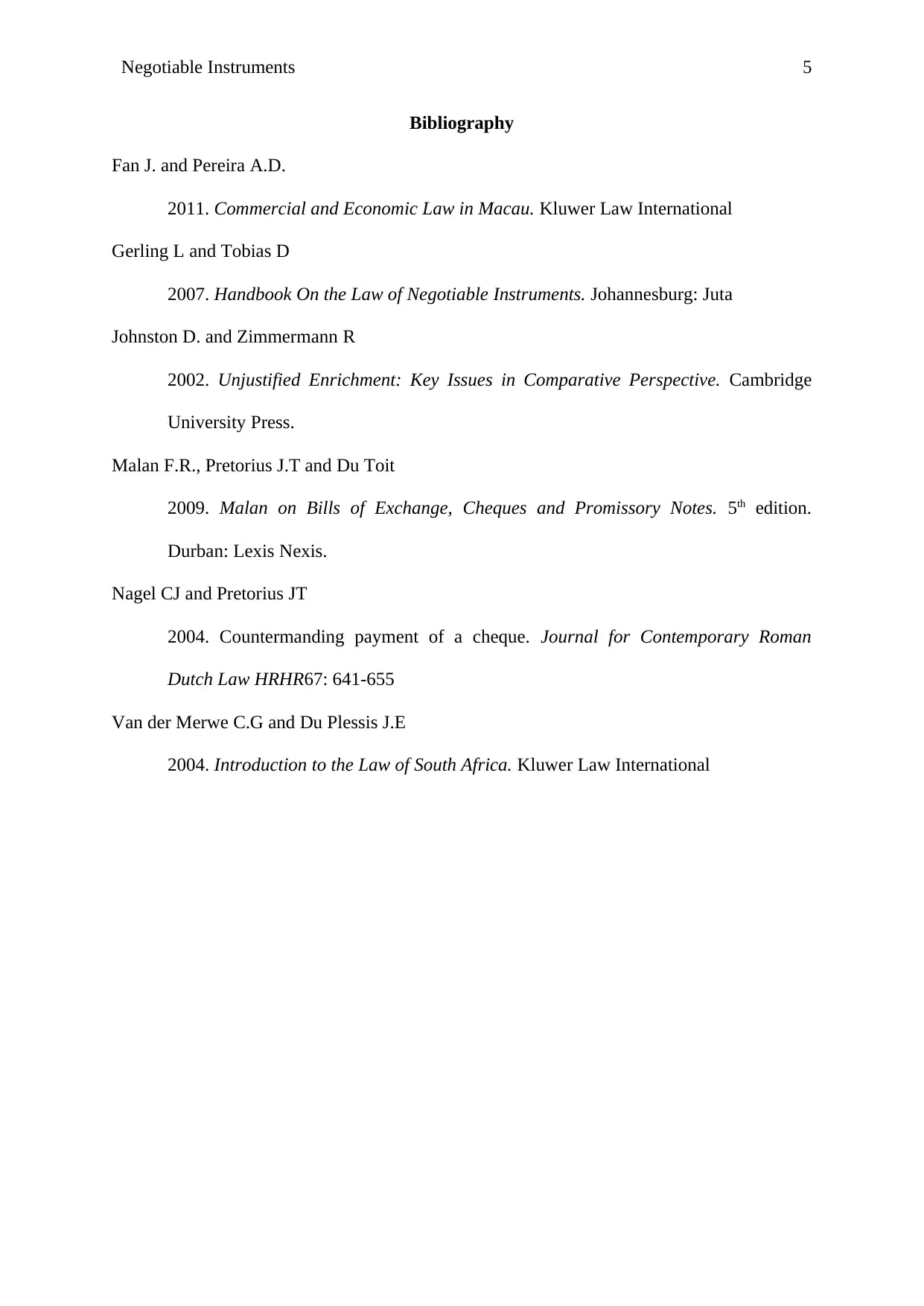
Negotiable Instruments 5
Bibliography
Fan J. and Pereira A.D.
2011. Commercial and Economic Law in Macau. Kluwer Law International
Gerling L and Tobias D
2007. Handbook On the Law of Negotiable Instruments. Johannesburg: Juta
Johnston D. and Zimmermann R
2002. Unjustified Enrichment: Key Issues in Comparative Perspective. Cambridge
University Press.
Malan F.R., Pretorius J.T and Du Toit
2009. Malan on Bills of Exchange, Cheques and Promissory Notes. 5th edition.
Durban: Lexis Nexis.
Nagel CJ and Pretorius JT
2004. Countermanding payment of a cheque. Journal for Contemporary Roman
Dutch Law HRHR67: 641-655
Van der Merwe C.G and Du Plessis J.E
2004. Introduction to the Law of South Africa. Kluwer Law International
Bibliography
Fan J. and Pereira A.D.
2011. Commercial and Economic Law in Macau. Kluwer Law International
Gerling L and Tobias D
2007. Handbook On the Law of Negotiable Instruments. Johannesburg: Juta
Johnston D. and Zimmermann R
2002. Unjustified Enrichment: Key Issues in Comparative Perspective. Cambridge
University Press.
Malan F.R., Pretorius J.T and Du Toit
2009. Malan on Bills of Exchange, Cheques and Promissory Notes. 5th edition.
Durban: Lexis Nexis.
Nagel CJ and Pretorius JT
2004. Countermanding payment of a cheque. Journal for Contemporary Roman
Dutch Law HRHR67: 641-655
Van der Merwe C.G and Du Plessis J.E
2004. Introduction to the Law of South Africa. Kluwer Law International
1 out of 5
Your All-in-One AI-Powered Toolkit for Academic Success.
+13062052269
info@desklib.com
Available 24*7 on WhatsApp / Email
![[object Object]](/_next/static/media/star-bottom.7253800d.svg)
Unlock your academic potential
Copyright © 2020–2026 A2Z Services. All Rights Reserved. Developed and managed by ZUCOL.